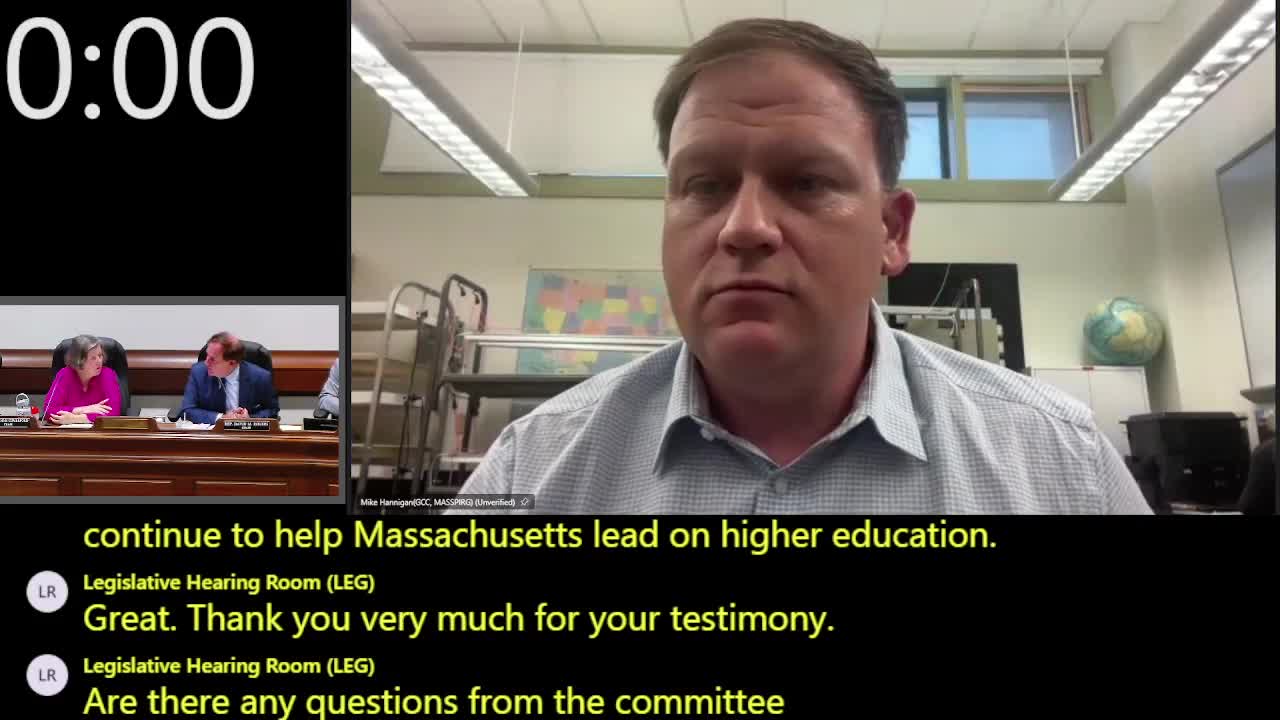Abigail Raymond advocates for debt free public higher education in Massachusetts
July 18, 2025 | 2025 Legislature MA, Massachusetts
This article was created by AI summarizing key points discussed. AI makes mistakes, so for full details and context, please refer to the video of the full meeting. Please report any errors so we can fix them. Report an error »

The Massachusetts Joint Committee on Higher Education convened on July 18, 2025, to discuss critical issues surrounding public higher education, with a strong focus on affordability and accessibility for students. A key highlight of the meeting was the testimony from Abigail Raymond, a student trustee from the University of Massachusetts Boston, who passionately advocated for debt-free public higher education and the establishment of an Open Educational Resources (OER) trust fund.
Raymond emphasized the alarming trend of rising tuition costs in Massachusetts, which are increasing faster than in any other state. She shared her personal experience of navigating the financial burdens associated with college, noting that many students are forced to take on significant debt or work multiple jobs to afford their education. Despite receiving a scholarship, she pointed out that the costs of attending even state universities remain a barrier for many students, perpetuating a cycle of debt.
Raymond urged the committee to support two specific bills: H.1436, which aims to allow all residents to attend public institutions without incurring crippling debt, and H.1427, which seeks to fund initiatives that provide low-cost textbook options. She highlighted the importance of these measures in alleviating financial hardships, addressing housing issues, and combating food insecurity among students.
The committee also heard from Jonathan Gale, who expressed support for similar initiatives on behalf of grandparents, further underscoring the broad community backing for reforms in higher education funding.
The discussions at this meeting reflect a growing recognition of the urgent need for systemic changes in how public higher education is funded in Massachusetts. As the committee considers these bills, the implications for students and families across the Commonwealth could be profound, potentially reshaping the landscape of higher education access and affordability in the state. The committee's next steps will be crucial in determining the future of public higher education in Massachusetts.
Raymond emphasized the alarming trend of rising tuition costs in Massachusetts, which are increasing faster than in any other state. She shared her personal experience of navigating the financial burdens associated with college, noting that many students are forced to take on significant debt or work multiple jobs to afford their education. Despite receiving a scholarship, she pointed out that the costs of attending even state universities remain a barrier for many students, perpetuating a cycle of debt.
Raymond urged the committee to support two specific bills: H.1436, which aims to allow all residents to attend public institutions without incurring crippling debt, and H.1427, which seeks to fund initiatives that provide low-cost textbook options. She highlighted the importance of these measures in alleviating financial hardships, addressing housing issues, and combating food insecurity among students.
The committee also heard from Jonathan Gale, who expressed support for similar initiatives on behalf of grandparents, further underscoring the broad community backing for reforms in higher education funding.
The discussions at this meeting reflect a growing recognition of the urgent need for systemic changes in how public higher education is funded in Massachusetts. As the committee considers these bills, the implications for students and families across the Commonwealth could be profound, potentially reshaping the landscape of higher education access and affordability in the state. The committee's next steps will be crucial in determining the future of public higher education in Massachusetts.
View full meeting
This article is based on a recent meeting—watch the full video and explore the complete transcript for deeper insights into the discussion.
View full meeting
